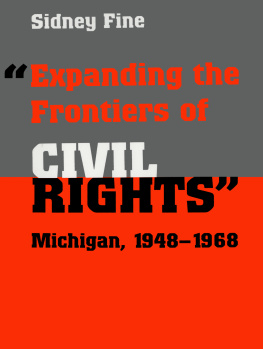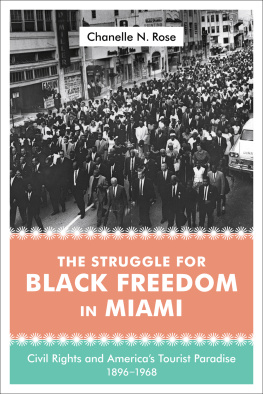EXPANDING
THE FRONTIERS
OF CIVIL RIGHTS
M ICHIGAN , 19481968
S IDNEY F INE
Philip P. Mason, Editor
Department of History, Wayne State University
Dr. Charles K. Hyde, Associate Editor
Department of History, Wayne State University
Copyright 2000 by Wayne State University Press, Detroit, Michigan 48201.
All material in this work, except as identified below, is licensed under a Creative Commons Attribution-NonCommercial 3.0 United States License. To view a copy of this license, visit https://creativecommons.org/licenses/by-nc/3.0/us/.
All material not licensed under a Creative Commons license is all rights reserved. Permission must be obtained from the copyright owner to use this material.
ISBN 978-0-8143-4328-9 (alk. paper); 978-0-8143-4329-6 (ebook)
The publication of this volume in a freely accessible digital format has been made possible by a major grant from the National Endowment for the Humanities and the Mellon Foundation through their Humanities Open Book Program.
Wayne State University Press thanks the Archives of Michigan and the University of Michigan (Bentley Historical Library) for their generous permission to reprint material in this book.
http://wsupress.wayne.edu/
C ONTENTS
P REFACE
Although historians and others have devoted a great deal of attention to the development of U.S. government policy regarding civil rights in the quarter century following World War II, relatively little attention, with the exception of New York State, has been paid to the equally important developments at the state government level. In few states during these years did civil rights policy undergo a more dramatic transformation than in Michigan. In 1948 the Michigan Committee on Civil Rights characterized the state of civil rights in Michigan as presenting an ugly picture. Twenty years later, however, Michigan was a leader among the states in the protection it accorded the civil rights of its inhabitants.
The Michigan civil rights program embraced not only African Americans, the principal focus of civil rights concern in the nation in the postWorld War II era, but also women, the elderly, Native Americans, migrant workers, and the physically handicapped. Three governorsDemocrats G. Mennen Williams and John B. Swainson and Republican George Romneyplayed leadership roles in furthering the civil rights cause in Michigan. All three used their executive power to promote civil rights in the state, but Williams and Swainson, although winning some legislative victories, were largely thwarted by an unsympathetic legislature in securing the civil rights legislation they favored. The major civil rights legislation between 1948 and 1968 was enacted during the Romney governorship, thanks to the civil rights provisions of Michigans 1963 constitution and Romneys ability to gain bipartisan support for the civil rights legislation he advocated. The growing influence of the civil rights movement in Washington and across the nation while Romney was governor helped to create a climate of opinion that facilitated the enactment of civil rights legislation in Michigan.
My research for this book was facilitated by Francis Blouin, William Wallach, Nancy Bartlett, Anne Frantilla, Karen Jania, and Thomas Powers of the Bentley Historical Library; Margaret Raucher and Michael Smith of the Wayne State University Archives of Labor and Urban Affairs; LeRoy Barnett and Mark E. Harvey of the State Archives of the Michigan History Division; Frederick L. Monhart of the Michigan State University Archives; Janet Whitson of the Burton Historical Collection; Ellen B. McCarthy and Judith L. Brownlee of the Michigan Department of Civil Rights; Richard Harms of the Grand Rapids Public Library; Joellen ElBashir of the Moorland-Spingarn Research Center; Harold L. Miller of the State Historical Society of Wisconsin; and Kerry J. Norce of the Presbyterian Historical Society. I am grateful to Kristen Dombkowski for the expert typing of the manuscript. As always, my wife, Jean Fine, was my indispensable partner in the preparation of this book.
I dealt with some of the issues treated in the book in A Jewel in the Crown of All of Us: Michigan Enacts a Fair Employment Practices Act, Michigan Historical Review 22 (Spring 1996): 1966; Michigan and Housing Discrimination, Michigan Historical Review 23 (Fall 1997): 81114; and Civil Rights and the Michigan Constitution of 1963, Bentley Historical Library Bulletin No. 43, June 1996. I have received permission from the Michigan Historical Review and the Bentley Historical Library to use portions of these items.
A N U GLY P ICTURE : Civil Rights in Michigan, 1948
As Milton R. Konvitz has noted, it was state action regarding civil rights that helped prepare the ground for a comprehensive and far reaching federal law such as the Civil Rights Act of 1964. At the same time, however, it was the establishment in 1941 by President Franklin D. Roosevelt of the Committee on Fair Employment Practice and the 1947 report of President Harry S. Trumans Committee on Civil Rights that helped to spur state action in the civil rights field.
Under the leadership of Governors G. Mennen Williams, John B. Swainson, and George Romney, Michigan between 1949 and 1968 demonstrated a growing concern for the civil rights of African Americans, Native Americans, women, the elderly, migrant workers, and the physically and mentally handicapped among its inhabitants. Despite gubernatorial commitment and prodding, however, Michigan, because of legislative resistance, initially lagged behind some of the other states in its adoption of civil rights measures. By the end of 1968, however, Michigan was in the forefront among the states in the scope and effectiveness of its civil rights measures.
Michigans first civil rights legislation was adopted in 1867, when racial segregation in public education was banned in the state. Two years later a Michigan statute prohibited life insurance companies doing business in the state from discriminating on the basis of race, and an 1883 law removed the states ban on miscegenation. In a key action in 1885, the legislature made racial discrimination in public places of accommodation, amusement, and recreation and in the selection of jurors subject to criminal sanctions. Like the similar laws of most states, the 1885 measure, which was strengthened in 1937, proved to be ineffective. Prosecutors had been reluctant to prosecute under the law and juries to convict, and aggrieved individuals had been disinclined to sue for damages, as the statute provided.
The Michigan state constitution in effect in 1948 contained a section in the documents Declaration of Rights stating, All political power is inherent in the people. Government is instituted for their equal benefit, security and protection. The language, however, lacked the explicitness of an equal protection guarantee and had been employed after the constitution went into effect in 1908 largely in dealing with classifications in regulatory legislation based upon the police power. Another section of the Declaration of Rights provided that the civil and political rights, privileges and capacities of no person shall be diminished or enlarged on account of his religious belief, but reference to race, color, national origin, ancestry, and gender was notably missing from the section. Although the constitution prohibited the removal or demotion of an individual from the state civil service because of partisan, racial, or religious considerations, the ban did not apply to appointments, municipal government employees, or employees in private business.












